Sustainable Honey Production: Insightful Case Studies
Did you know that bees pollinate over 75% of top food crops around the world? This fact shows how vital sustainable beekeeping is. Exploring eco-friendly beekeeping, we find new ways to harvest honey. These protect both bees and our environment.
This article looks at case studies of moving towards sustainable honey making. We see how beekeepers globally are adopting eco-friendly methods. This ensures a bright future for bees and the ecosystems they support.
Key Takeaways
- Eco-friendly beekeeping is key to keeping global food crops pollinated.
- Around the world, new methods are being used to keep bees safe.
- Using sustainable ways in beekeeping helps protect our environment and biodiversity.
- Case studies show how these eco-friendly techniques are working in honey making.
- Beekeepers are putting the health of bees and nature first in their work.
Introduction to Sustainable Honey Production
Sustainable honey production is crucial in today’s beekeeping. It brings many benefits to both the environment and the economy. By embracing sustainable practices, beekeepers ensure bees live longer. They also support the global honey market and biodiversity through bee conservation.
The Importance of Sustainability in Beekeeping
In today’s world, being sustainable in beekeeping is key. Adopting these practices helps to protect bees from pesticides and losing their homes. It keeps the ecological balance. This makes sure bees keep doing their important work in pollination and biodiversity.
Global Trends in Honey Production
Looking at the global honey market shows a move towards sustainable methods. People now want honey that is ethically sourced. This change is helping the environment and the industry’s future.
Role of Bees in Biodiversity Conservation
Bees play a vital role in keeping ecosystems diverse. They are key to pollinating many plants. The conservation of bees helps many kinds of plants and animals. Sustainable beekeeping creates a healthy home for bees. This benefits the whole natural world.
| Aspect | Impact |
|---|---|
| Sustainable Beekeeping Practices | Mitigates negative impacts on bee health, ensures ecological balance |
| Global Honey Market Trends | Supports demand for ethically sourced honey, promotes eco-friendly practices |
| Biodiversity Through Bee Conservation | Maintains diverse ecosystems, supports multiple species |
Just Bee Honey: A Journey Towards Automation
Just Bee Honey shows us how automating honey production can change the game. They’ve gone from old-school, hands-on methods to become a leading smart factory. Now, they’re at the forefront of beekeeping’s digital era.
From Handmade to Smart Factory
At first, Just Bee Honey stuck to manual, craft-based ways. But then they saw a chance to do things better and switched to smart manufacturing. This move not only made their work more efficient but also brought advanced automation into honey making.
The Challenge: Pandic Impact on Sales
The pandemic hit hard, dropping sales dramatically. With less resources and a shaky market, they were forced to get creative fast. Just Bee Honey quickly shifted gears to face these new challenges head-on.
The Solution: Digital Transformation with Made Smarter
They decided to digitally transform, teaming up with Made Smarter. Working together, they brought in state-of-the-art tech. This step up greatly improved how they work, making them stronger and more efficient.
The Benefits: Efficiency, Quality and Traceability
The move to automation brought many pluses:
- Efficiency: Automation made work smoother, cutting down on manual tasks and boosting operation times.
- Quality: A more uniform process meant the honey they made was of a higher quality.
- Traceability: Better tracking systems meant each honey jar could be traced back to where it came from. This increased openness.
The Future: Growth and High-Skilled Jobs
Looking forward, Just Bee Honey is set for big growth. Their shift to a smart factory is not just about making more honey. It’s also creating skilled jobs which is great for the local community and the world of beekeeping.
| Aspect | Traditional Methods | Smart Factory Development |
|---|---|---|
| Production Capacity | Limited | Expanded |
| Quality Control | Inconsistent | High and Consistent |
| Efficiency | Manual Labour Intensive | Automated and Streamlined |
| Job Creation | Low-Skilled | High-Skilled |
Case Studies in Sustainable Honey Production
Looking into innovative beekeeping case studies shows us how to keep bees in a good way that helps the planet. We learn from successful honey production success stories from different places. Here, you’ll see how beekeepers are updating their old ways to build green and successful honey businesses.
In Monmouthshire, beekeepers have chosen to go organic. They avoid synthetic chemicals and use natural pest control methods. This change has led to healthier hives and more honey, becoming a leading example of sustainable apiculture.
Yorkshire beekeepers have a great system where they reuse beeswax. They make things like candles and lip balms from the waste. This approach not only uses all the bee products but also cuts down on waste. It shows strong commitment to sustainability and is known as one of the top honey production success stories.
Down in Devon, a group is focusing on teaching. They hold workshops on sustainable apiculture and get the community involved. They’re training the next wave of beekeepers. Their work has made beekeeping and honey making an important part of the area’s culture.
- Monmouthshire Organic Practices: Increased hive health and honey yield.
- Yorkshire Closed-Loop System: Maximised product use and waste reduction.
- Devon Educational Outreach: Community involvement and beekeeping education.
These innovative beekeeping case studies show that green beekeeping is both possible and good. I believe these methods can make the future of honey making brighter. They can help our environment and also make businesses more successful.
ARYODI Bee Farm: Empowering Ugandan Communities
ARYODI Bee Farm is a great example of how innovation can empower communities. Started with a purpose, it shows the positive change that social entrepreneurship in honey production can bring. It helps local people and their economies grow.
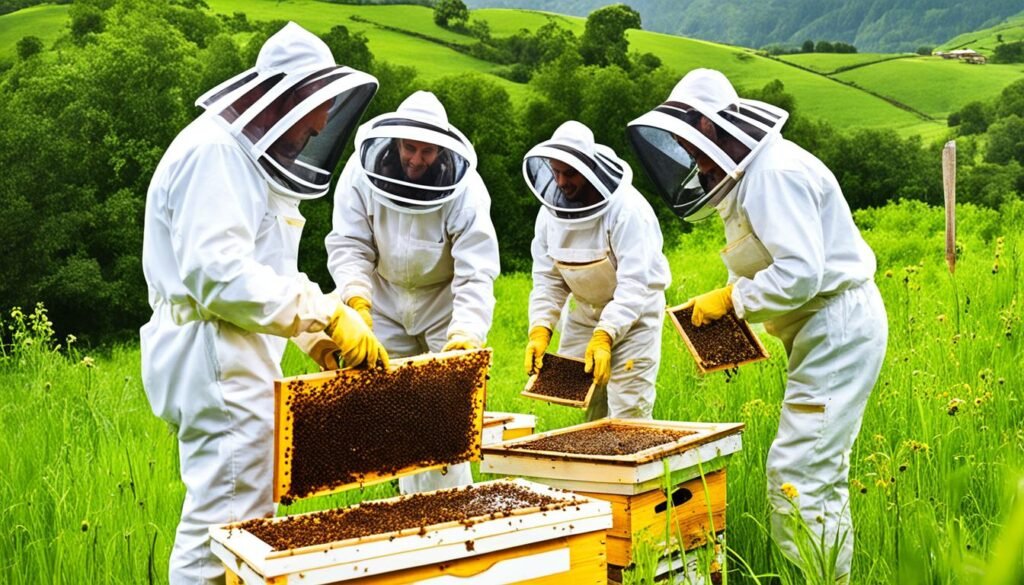
The Vision of Robert Okodia
Robert Okodia is the brain behind ARYODI Bee Farm. He has worked tirelessly to promote empowering beekeeping communities in Uganda. His aim is to blend sustainable honey making with enhancing local communities. This creates a win-win situation for people and bees alike.
Challenges in Traditional Beekeeping
Traditional beekeeping in Uganda has met plenty of hurdles. These include limited access to new techniques and poor honey extraction methods. These issues lower the productivity and quality of honey. They make it tough for local beekeepers to stand out in the market.
Innovative Solutions for Sustainable Honey Production
To tackle these problems, ARYODI Bee Farm has brought in novel ideas. It has upgraded beekeeping gear, introduced modern hive management, and started training programmes. These steps ensure sustainable honey production. They not only raise honey yields but also look after the bees’ health.
Impact on Women and Youth
The focus on social entrepreneurship in honey production at ARYODI has deeply influenced the community’s women and youth. Training and jobs have enriched many lives. They have given skills and resources needed for successful beekeeping. This boosts economic freedom and builds pride among these individuals.
Thanks to these actions, ARYODI Bee Farm now leads the way in Uganda bee farms. It inspires other communities to follow its lead in sustainable and ethical honey production.
Impact of Digital Transformation on Honey Production
Digital transformation is changing the honey production industry for the better. It makes the industry more efficient and productive. By using data wisely, honey businesses can now work more smoothly and be more sustainable.
Joshua Greaves: Data and Systems Integration
Joshua Greaves has made a big difference in beekeeping by bringing in advanced data use. This allows beekeepers to make smart decisions that boost productivity. It also helps in managing bees and resources well.
Spice Kitchen: Cloud-Based Solutions for Efficiency
Spice Kitchen has turned to cloud-based technologies for better honey production. These technologies help keep track of everything in real time, making things much more efficient. Using cloud platforms means easier tracking of honey, better inventory management, and smoother supply chains. This cuts wastage and boosts profits.
Spiroflow: Remote Monitoring with IIoT
Spiroflow uses IIoT to manage beekeeping from afar, changing the way honey is produced. The IoT technology monitors beehives continuously. This means beekeepers can solve problems quickly, keeping health in bee populations up and losses down.
The table below shows how digital transformation benefits honey production in different ways:
| Aspect | Traditional Method | Digital Method | Benefits |
|---|---|---|---|
| Data Management | Manual Recording | Automobile Data Integration | Accuracy and Efficiency |
| Monitoring | On-Site Checks | Remote IIoT Monitoring | Real-Time Insights & Faster Response |
| Operations | Fragmented Systems | Cloud-Based Solutions | Streamlined Workflows |
Economic and Environmental Benefits of Sustainable Honey Production
Sustainable honey production is great for both the economy and the environment. It uses modern beekeeping methods to make the industry more efficient. This leads to lower costs and more honey. These methods also protect nature. They help different plants and animals thrive and keep bees healthy.
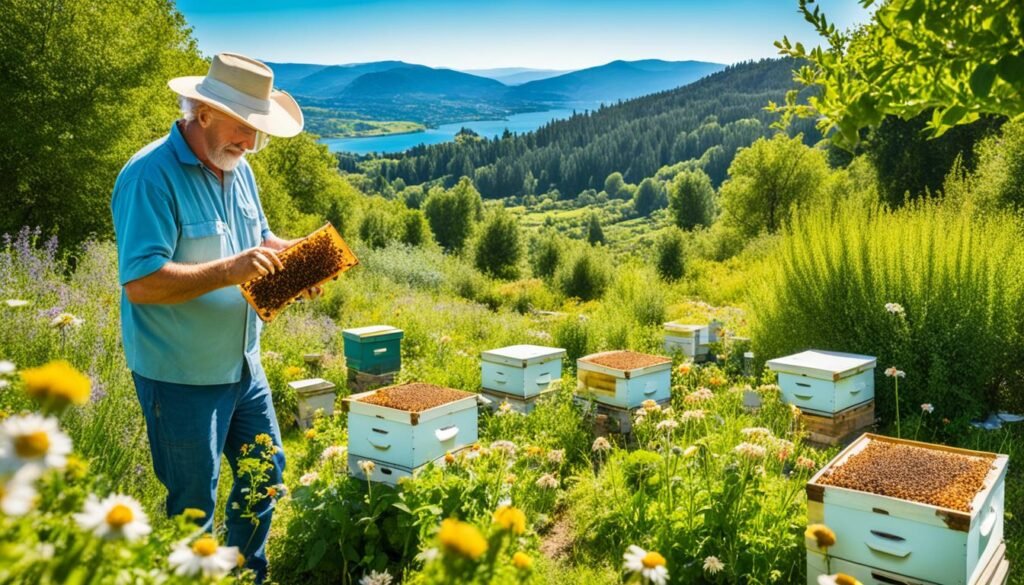
Reducing Costs and Enhancing Productivity
Using sustainable methods in honey making cuts down costs. Things like better hive management and feeding save resources. Healthier hives mean more honey and fewer problems with diseases or pests. This improves the amount of honey made and reduces losses.
Positive Environmental Impact of Modern Beekeeping
Modern beekeeping works well with nature. Eco-friendly methods boost pollination, helping plants around them. They keep ecosystems balanced, important for many plant species. Using natural treatments and less chemicals protects bees and nature’s variety.
| Economic Benefits | Environmental Benefits |
|---|---|
| Cost reduction in beekeeping | Enhanced biodiversity |
| Productivity gains in honey production | Positive ecological impacts |
| Reduced resource expenditure | Healthier bee populations |
Technological Innovations in Sustainable Honey Production
In the fast-changing world of honey production, new technologies are key for sustainability and efficiency. Modern methods have transformed old ways, benefiting both beekeepers and customers. Here, we’ll look at the latest innovations in honey production.
Automated Honey Processing Solutions
Automated honey processing stands out as a major advancement. It boosts efficiency and ensures the honey’s quality. Automation means tasks like extraction, filtering, and packaging are more productive, with less chance of contamination.
Benefits of Digital Batch-Coding Systems
Digital batch-coding systems are vital for tracking honey. They let us follow honey batches from the hive to the shop. With this system, every honey jar gets a unique code. This helps trace its path, increasing consumer trust and meeting quality standards.
Using these technologies improves automation in many ways. It leads to better traceability, quality control, and efficiency. By adopting these innovations, we are making honey production more sustainable and transparent.
Consumer Trends and Their Influence on Sustainable Practices
In today’s world, what consumers like is key in shaping sustainable honey production. A big move towards eco-friendly products is now in the spotlight. More people are thinking carefully about what they buy. This boom in wanting environmentally friendly goods is making big changes in the industry.
Growing Demand for Eco-Friendly Products
The rise in wanting eco-friendly products is something I’ve seen a lot. Consumers aren’t just happy with any product now. They want ones that are made in a way that’s good for the planet. For honey, this means using methods that are good for all plants and animals and don’t harm the environment.
Importance of Local and Organic Honey
The push for local and organic honey is also getting stronger. People want honey that’s clean, without any bad chemicals. They also like to buy honey made close to home. This helps local beekeepers and cuts down on pollution from moving goods around. These trends show a bigger shift towards being kinder to our planet and supporting local workers.
So, the push for products that are good for the Earth, clean, and local is changing the honey market. By listening to what people want, producers can help our planet while also making what people are looking for. This great match between what people buy and doing good for the Earth is hopeful for both the honey industry and our world.

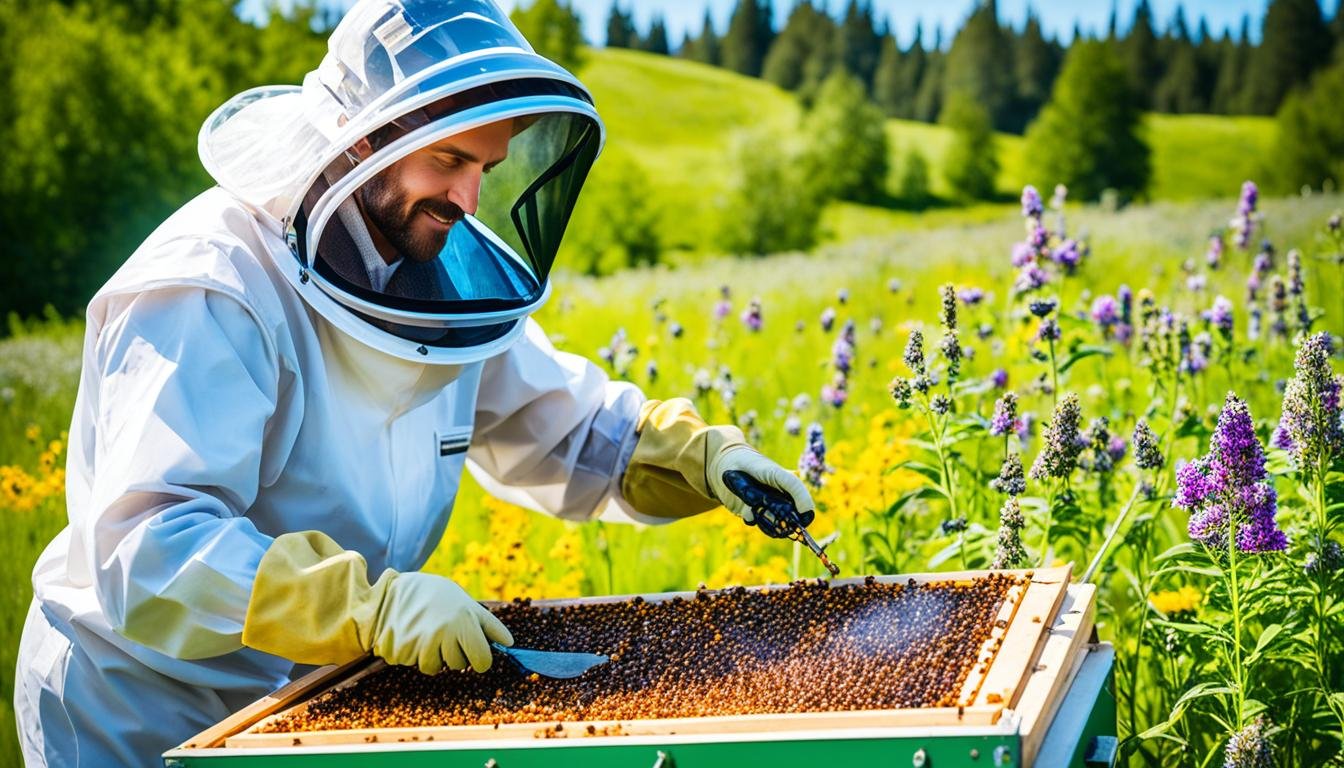
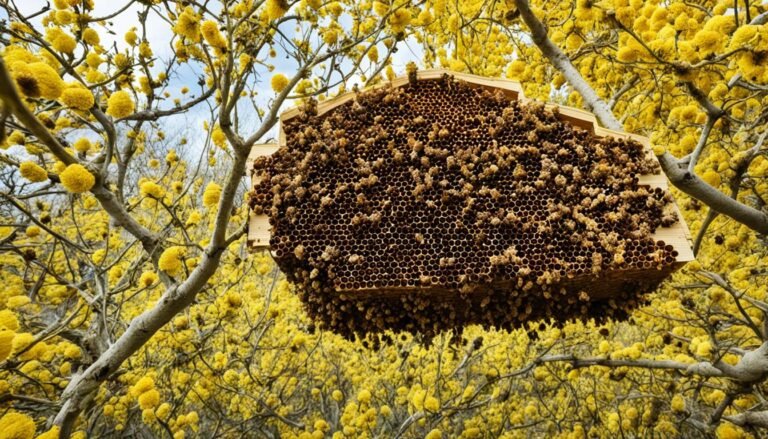
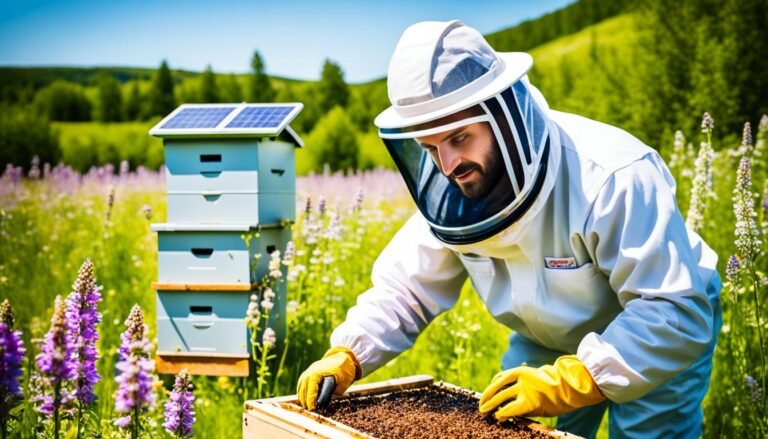

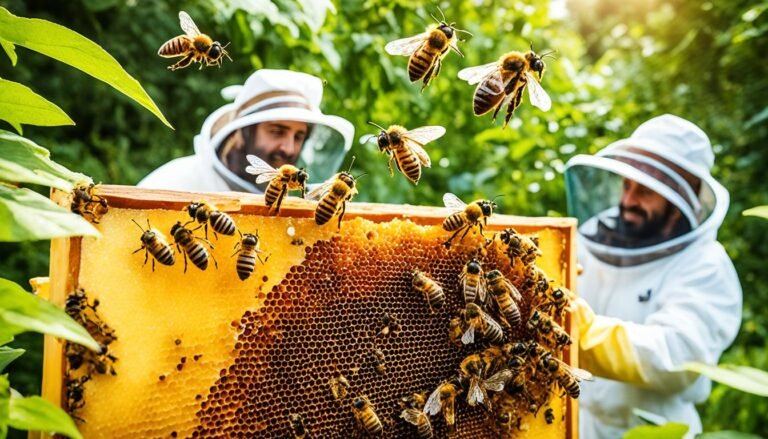

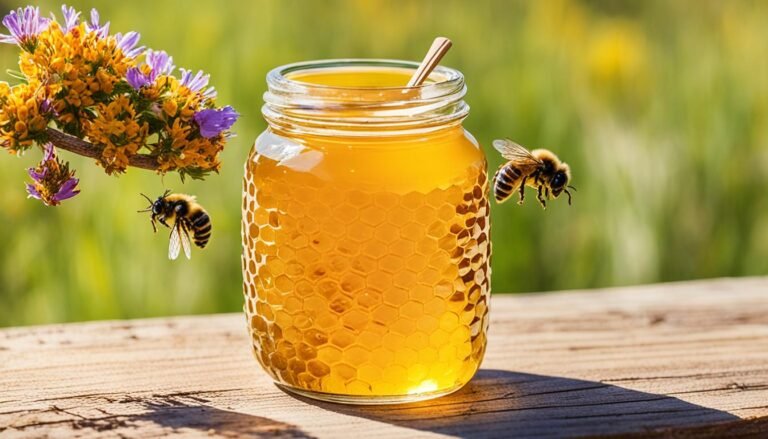
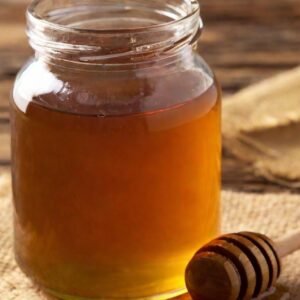 Wildflower Honey
Wildflower Honey